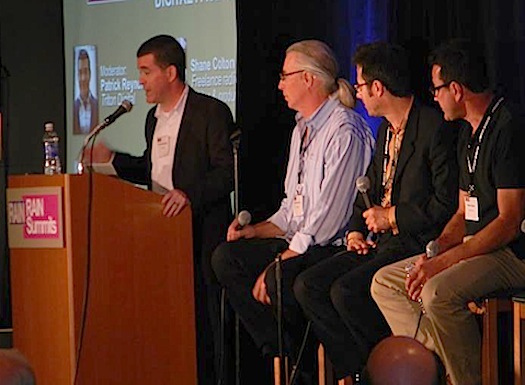At this year’s Radio and Internet Summit in Orlando Florida, panelists discussed a range of new models for artists and recording labels to cut out the copyright collecting societies and introduce new revenue models for artists to make money from online radio and music streaming services.
Speaking on a panel titled Streaming Music Trends, consultant Ted Cohen explored new models for online radio and music streaming services to pay artists. One of the suggestions was to cut out the copyright collecting societies because the government mandated payment model is out of date.
Several panelists agreed with Cohen, saying some music streaming services are now doing direct licencing deals with record labels because they have more flexibility in negotiations and are not bound by outdated government copyright laws that were written before the internet was invented.
Several new payment models were discussed, including ‘windowing’ direct sales so that if a listener wants to buy a newly released song or album during a window of time immediately after it is released, they will pay more, but if they are prepared to wait they can buy it for less. This model works for on-demand movies, are is one of the new models being discussed. iHeart Radio is believed to be one online music service that is exploring this licencing model.
Split revenue deals, where labels get a percentage of streaming revenue, were also discussed, although problems with this model were identified, to do with the definition of revenue agreed between the parties.
Rock band cellist Patrick Laird described his experience with music streaming and online radio plays of his music. “Radio has always been the way people discover music, internet radio is just a better version of radio,” he said. Laird told stories of how his music had been discovered world wide due to internet radio and streaming music services.
“As a result of being played on the internet we were booked for a concert in Alaska. The fee from that one concert was more than our yearly royalty fee from Pandora,” Laird told delegates. Asked whether he would want to be paid for streaming or to gain exposure from streaming without being paid, he said expose is more lucrative, at present, than the royalties that musicians are getting from streaming services.
He suggested that new business models need to be developed and agreed with the proposition that the old way of collecting revenue from copyright collecting services should become more flexible.
Unsurprisingly other speakers from copyright collecting societies disagreed with this notion, pointing out that direct deals with artists or labels could leave out artists who are on labels that no longer exist, and also pointing out that there may be increased compliance costs in increased reporting.
In another session, Pandora’s profit ratios were discussed. Pandora is seeking to balance the rapid growth of mobile listeners, and the resulting increase in music royalties, with the company’s need to sell enough advertising to fill all those hours of streaming. In its latest financial report, the company says it paid $21.09 for every 1,000 hours of programming and averaged $41.73 in ad revenue on computers and mobile devices. Subscription revenue, mostly from the $34-a-year commercial-free Pandora One service, more than doubled to $28.8 million.
One speaker revealed the way to hear less ads on Pandora ad subsidised service: “Tell them you are over 70. If you’re that old no one wants to advertise to you, so you’ll only get a few ads per week. If you profile shows that you are under 25 you will hear lots of ads, because everyone wants to advertise to you.”
For the fourth straight year, Pandora was named the 2013 RAIN Internet Radio Best Overall Online Radio Service. The RAIN Internet Radio Awards were presented at the conclusion of today’s RAIN Summit.
Pandora’s prize follows a series of somewhat less pleasant developments for the webcaster. For starters, we’re mere hours away from the launch of what will very likely prove to be Pandora’s greatest competitive threat yet: Apple’s iTunes Radio.
Late yesterday, Pandora publicly warned share holders that the rapid listening and revenue growth it’s enjoyed these past few years will likely be slowing. Earlier today, RAIN Summit keynote speaker Entercom CEO David Field questioned the veracity of Pandora’s reported listening numbers.
The RAIN Summit is being held in Orlando Florida in conjunction with the NAB RadioShow.
In Australia, we have different copyright laws from America, but some of the trends being discussed may well set precedents for new ways of doing things all over the world.
See recent related coverage of streaming radio and the changing business models:
Will you still have a job in radio a year from now?
Straight to number 1 for iHeartRadio’s new app
Message to Michael … … Get Off Radio’s Case
Radio revenue won’t crumble: Warner responds to Venture’s forecasts

